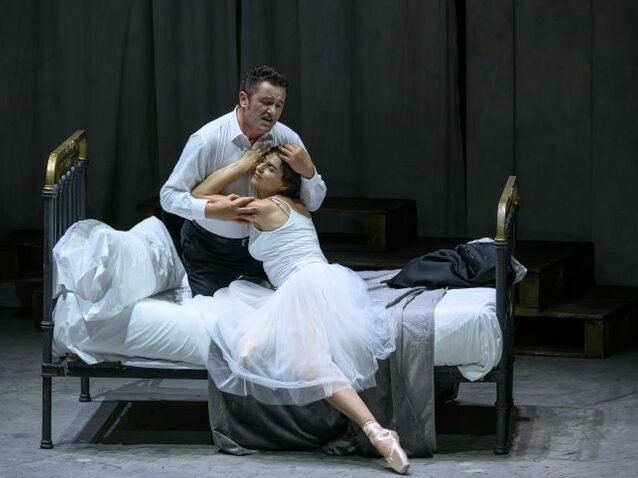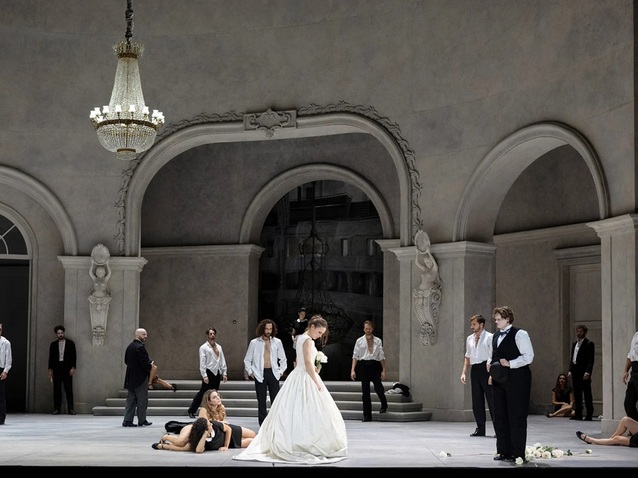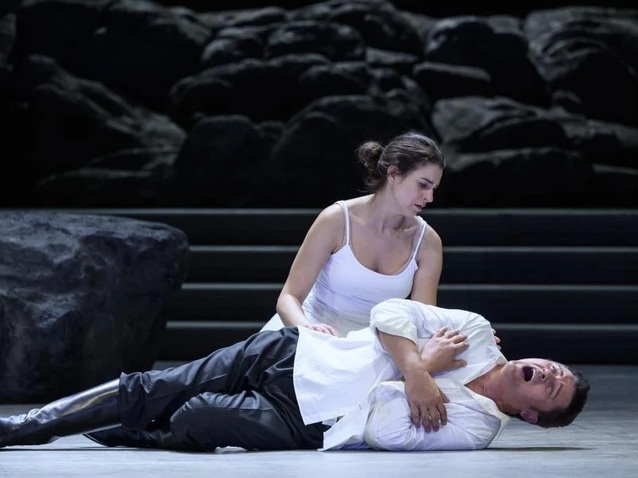 © A. Bofill / Liceu
© A. Bofill / Liceu
Fairy tales and witches are often – sugar-coated in disguise – terrible narratives full of anguish, loneliness, and fear. Beneath the barely concealed veneer of culture, they pulse with our “dark sides”, our most disorderly desires, alien to any moral framework. This is why it is so educational and necessary to tell these stories to our children from an early age, so they can name and shape their fears to grow up healthy. We must give a name and face to our fears early, because only by naming them can we face them with any hope of success.
Rusalka, based on, among other sources, Hans Christian Andersen's tale The Little Mermaid (the same one that inspired the well-known “children’s” Disney film), tells the story of the water nymph who, driven by love and with tragic consequences, decides to become human.
It is clear that when Antonín Dvořák, four years before his death, poured all his energy and wisdom into composing Rusalka, he had no intention of telling us a fairy tale. He knew that he was setting music to a story about the price we pay for wanting to live in a “different world” where we believe our desires will come true.

Rusalka - Gran Teatre del Liceu Barcelona (2025) (c) A. Bofill
Rusalkais the stuff of psychoanalyst’s couches, and the production of this splendid work, which the Liceu has brought to its stage to close the season, points in that direction. Co-produced by Liceu alongside Teatro Real in Madrid (where it was performed in 2020), Palau de les Arts in Valencia (which presented it in 2024), and the Staatsoper in Dresden (which offered it in 2022), the production is staged by Christof Loy.
The highlight of Loy’s work is his magnificent, meticulous direction of the actors, ensuring that every movement on stage feels theatrically meaningful. The downside, however, is that his intentions – which one assumes are there – do not reach the audience clearly. It leaves them confused and unable to understand where the director is heading by relocating the action to the foyer of a theatre and turning the water nymph into a limping ballerina (a brilliant metaphor, nonetheless, for someone who cannot be who they are).
Loy has some theatrically strong moments, like the powerful final scene, but he also ruins other ones, such as the important witch’s enchantment, because – erroneously – he is not interested in the supernatural elements of the piece, A significant portion of the audience, at odds with the German director's approach, booed the production during the final curtain calls.

Rusalka - Gran Teatre del Liceu Barcelona (2025) (c) A. Bofill
Where there was unanimous agreement was in the enthusiastic praise for the musical and vocal aspects of the performance. Josep Pons once again achieved extraordinary orchestral performance across all sections, with an opulent, sweet string section, nuanced woodwinds, and powerful yet rounded brass, without any acidity. He brought out a beautiful “Slavic” sound from the orchestra, which might be described as a lighter, more colourful, sensual, and cantabile version of Wagner.
The vocal section was also excellent. Asmik Grigorian is one of the finest Rusalkas performing on stage today. She possesses abundant vocal resources to tackle the role, but above all, she is the character. She fills it with nuances, meaning, and intent. The Lithuanian soprano portrays a Rusalka who is powerful, immense in desire, yet vulnerable, fragile, and disoriented when confronting human misery. Her triumph was overwhelming and will remain in the theatre’s memory.
Piotr Beczala continues to have a beautiful voice, ideal for the role of the prince. His style is perfect, the Polish tenor knows the nuances of the Slavic school of singing well, and adjusted his voice to the requirements of the score. On stage, Beczala was fine, though his prince was conventional, and he did not immerse himself in the character as deeply as Grigorian did.
Aleksandros Stavrakakis, making his debut on stage, impressed in the role of Vodnik, the water spirit and father of Rusalka. His voice is very beautiful and well-timbred, and with a bit more weight in the lower register, it would be even more impressive.
Karita Mattila brought sensuality and provocation to the character of the Foreign Princess, Rusalka’s rival, but her voice seemed somewhat opaque, lacking the brilliance one might have expected.
Ježibaba, the witch – a character that seems to irk Loy – was performed with full correctness, but without excellence, by mezzo-soprano Okka von der Damerau.
David Oller was good as the Hunter, and the three Rusalka nymphs were very well executed. The roles of the forest guard Hajny and the gamekeeper Kuchtík were splendidly portrayed by Manel Esteve and Laura Orueta. In a stroke of directorial brilliance, these characters were caricatured to the point of farce in order to cleverly resolve a secondary scene intended to provide essential information to the audience that otherwise might have felt cumbersome.
Xavier Pujol
Barcelona, 22th de June 2025
Rusalka by Antonín Dvořák. Piotr Beczala, tenor. Karita Mattila, soprano. Asmik Grigorian, soprano. Aleksandros Stavrakakis, bass. Okka von der Damerau, mezzosoprano. Manel Esteve, baritone. Laura Orueta, mezzosoprano. David Oller, baritone. Julietta Aleksanyan, soprano. Laura Fleur, mezzosoprano. Alyona Abramova, mezzosoprano. Orchestra and Choir of Gran Teatre del Liceu. Conductor, Josep Pons. Stage director, Christof Loy. Restaging, Johannes Stepanek. ScenographyJohannes Leiacker. Costumes, Ursula Renzenbrink. Lighting, Bern Purkrabek. Choreography, Klevis Elmazaj. Coproduction by Gran Teatre del Liceu, Teatro Real (Madrid), Staatsoper (Dresden) and Palau de les Arts (Valencia). Gran Teatre del Liceu.
the 24 of June, 2025 | Print
Comments